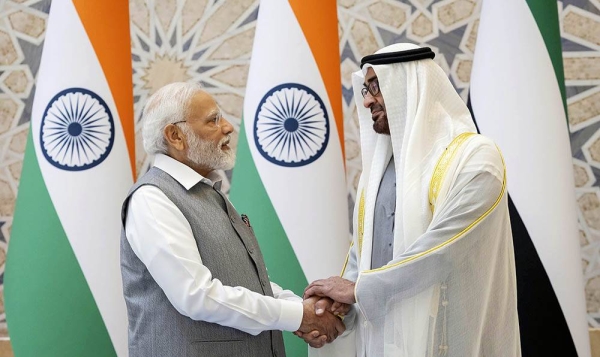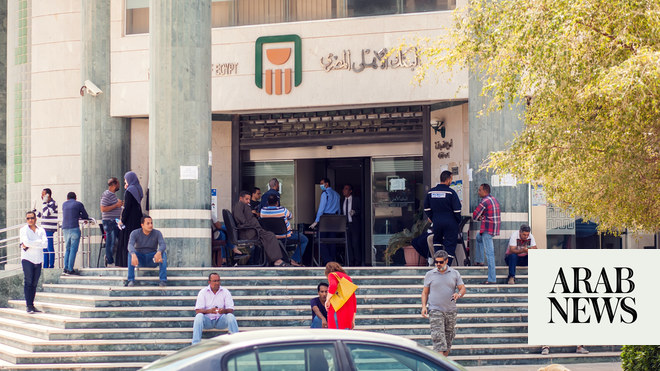
The United Ara Emirates (UAE) President Sheikh Mohamed Bin Zayed Al Nahyan Saturday received Indian Prime Minister Narendra Modi, who is on an official visit to the UAE.
Upon arrival at Qasr Al Watan in Abu Dhabi, the Indian prime minister’s motorcade was met by a group of Emirati children waving the flags of both countries.
Sheikh Mohamed greeted Modi and those who accompanied him during an official reception ceremony that included a guard of honor welcome, a 21-gun salute, and a performance of the national anthems of India and the UAE.
In a boost to bilateral trade and investments, Modi announced that India and the United Arab Emirates have agreed to start trade settlement in local currencies.
Modi said that he hopes that bilateral trade between the two countries goes past the $100 billion-mark soon, as it currently stands at $85 billion.
“The India-UAE comprehensive strategic partnership has been steadily strengthening and the Prime Minister’s visit will be an opportunity to identify ways to take this forward in various domains such as energy, education, healthcare, food security FinTech, defense and culture,” the Ministry of External Affairs (MEA) said.
It will also be an opportunity to discuss cooperation on global issues, particularly in the context of the UAE’s Presidency of COP-28 and India’s G-20 Presidency in which the UAE is a “special invitee”, it added.
The UAE and India have agreed to implement the use of local currencies for bilateral and cross border transactions, the announcement was made on the sidelines of Modi’s visit to Abu Dhabi on Saturday.
The Local Currency Settlement System will permit payment from exporters and importers in their respective local currencies, Indian Rupee (INR) or UAE Dirham (AED). This move will also further enable the development of an INR-AED foreign exchange market.
Minister of State for Foreign Trade Dr. Thani Bin Ahmed Al Zeyoudi, said, a year after their Comprehensive Economic Partnership Agreement (CEPA) took effect, the UAE and India have further strengthened their strategic relations.
In his statement to the Emirates News Agency (WAM), he stressed that the Emirati-Indian strategic partnership has seen positive developments at all levels, including the CEPA, which makes it a global model for how to upscale collaboration and partnership ties to higher levels that achieve mutual growth, create opportunities for business communities, stimulate entrepreneurship, and support sustainable development.
He noted that this would not be achieved without the shared keenness and unlimited support of the leaderships of the two countries.
He added that the UAE and India had entered a new phase of shared prosperity due to the CEPA that took effect a year ago, which has boosted key sectors in both countries, most notably non-oil trade and mutual investment.
In the first year of the partnership, their non-oil trade reached $50.5 billion, growing by 5.8 percent year-on-year, and compared to the previous year, from May 2020 to April 2021, non-oil trade grew by 53.5 percent, he added.
Moreover, it increased by 36.1 percent compared to the same period in 2019-2020, and by 29.6 percent compared to the same period in 2018-2019, Al Zeyoudi further said.
He stressed that the UAE-India partnership agreement boosted non-oil exports from the UAE, which reached $10.3 billion in the year of its implementation, a rise of 18.6 percent compared to the same period between 2020 and 2021.
Al Zeyoudi noted the UAE’s ongoing investment in India, which was driven by the impressive growth of one of the world’s fastest-growing economies.
As per the latest official data released this year, the UAE invested $36.61 billion in various sectors, including financial services, real estate, business services, alternative and renewable energy, engine manufacturing, equipment, and more.
The UAE chose India as the first country to sign a comprehensive economic partnership agreement with, in light of their strong strategic ties.
India is a key ally and partner for the UAE in trade and investment, and they have a long history of friendship. This is also India’s first agreement of this kind with a country in the Middle East and North Africa region.
Earlier, Modi, who was on a two-day visit to France, was treated to one of France"s most spectacular accolades on Friday as guest of honor at the Bastille Day military parade, part of a visit that has sealed high-profile defense deals.
Modi and President Emmanuel Macron watched French and Indian soldiers march down the tree-lined Champs-Elysees avenue in Paris, while French-made Rafale fighter jets India bought in 2015 took part in a fly-past over the Arc de Triomphe.
Modi on Thursday was granted the Legion of Honor, France"s highest award.
"(India) is a giant in the history of the world which will have a determining role in our future," Macron said in a speech late on Thursday. "It is also a strategic partner and a friend."
New Delhi has given an initial approval to buy an extra 26 Rafale jets for its navy and three Scorpene class submarines, deepening defense ties with Paris at a time the two nations are seeking allies in the Indo-Pacific.
The total value of the purchases is expected to be around 800 billion rupees ($9.75 billion), according to a source familiar with the details, although that was still subject to negotiations.
For France, the strategic partnership with India is crucial as it seeks to consolidate its alliance network in the Indo-Pacific region after being dealt a blow by Australia when Canberra decided to ditch a big French submarine contract and form the AUKUS alliance with Britain and the United States.
Both India and France through its island territories have deep interests in the Indian Ocean and are concerned about China"s growing assertiveness in the region. — WAM with input from agencies











